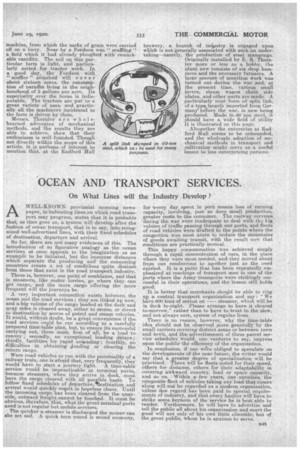OCEAN AND TRANSPORT SERVICES.
Page 27

If you've noticed an error in this article please click here to report it so we can fix it.
On What Lines will the Industry Develop ?
AWELL-KNOWN. provincial morning newspaper, inindicating lines,on which road transport may progress, states that it is probable that, as time goes on, a, system will develop after the fashion of ocean transport, that is to say, into recognized well-advertised lines, with their fixed schedules of destination, departure and arrival.
So far, there are not many evidences of this. The introduction of so figurative analogy as the ocean services at once appeals to the imagination as an example to be initiated, but the immense distances (which separate the producing and the consuming countries create a set of conditions -quite. distinct from those that exist in the road transport industry. There is, however, one point of semblance, and that is steamers, like motor lorries, go where they can get cargo, and, the more cargo offering the more frequent will the journeys he. .
' A very important connection exists between the ocean and the road services ; they are linked rip now, and a big volume of the cargo landed at the dock and quay sides is cleared away, either to stores, or direct to destination by scores of petrol and steam vehicles. It would, without doubt, be a great convenience if the road services could be run according to a carefully prepared time-table plan, but, to ensure its successful carrying out, there milk., first of all, be a load to convey ; secondly, no exceptional loading delays; thirdly, facilities for rapid unloading ; fourthly, no difficulties in obtaining *loading or clearing the return cargo.
Were road vehicles to rim with the punctuality of a railway train, one is afraid that, very frequently, they would have to start a journey light. A time-table service would be impracticable at terminal parts, because steamers, when they arrive in dock, must have the cargo cleared with all posaible haste. To follow fixed schedules of departure,Ilestination and arrival would quickly reault in hopeless chaos. Until -the incoming carp ha.s been cleared from the quayside, outward freight cannot be touched. . It must be obvious, therefore, that, what thegreat terminal ports need is not regular but mobile services.
The quicker a steamer is discharged the sooner can she Set sail. A quick turn round is sound economy, for -every day spent in port means loss of earning capacity, involving, just as does small production, greater costs to the consumer. The railway services during the war were inadequate to deal with th-s Lig volume of traffic passing through our ports, and fleets of road vehicles were drafted to the points where the congestion was most acute to reduce the mountains of -goods awaiting transit, with the result now that conditions are practically normal.
This happy consummation was achieved simply through a rapid concentration of cars, in the place where they were most needed, and, they moved about from one rendezvous to atiother just as the used existed. It is a point that has been repeatedly emphasized at meetings of transport men in one of the ports where the Army transports were strikingly successful in their operations, and the lesson, still holds good.
It is better that merchants should be able to ring un a, central transport organization and say: " We have 600 tons of cotton on — steamer, which will be in dock to-night. Please arrange to have it cleared to-morrow," rather than to have to trust to the slow, and not always sure, system of regular lines.
There is no reason, however, why the. time-table idea should not be observed more generally by the small carriers covering district areas or between town and town, and the advertisement of these parcel service schedules would, one ventures to say, impress upon the public the efficiency of the organization.
• In conclusion, if one were obliged to speculate, on the developments of the near future, the writer would say that a greater degree of specialization will be practised. There will be fleets noted for their epeed, others for distance, others for their adaptability in covering awkward country, load or space capacity, and so on. Within a. few years, one surmises, the composite fleet of vehicles taking any load that comes along will not be regarded as a Modern organization, unless due regard has been paid to special requirementa of industry, and that every haulier will havesto strike some keynote of the service he is best able to render. Furthermore, he will have to advertise, and tell the public all about his organization and court the good will not only of his own little clientele, but of the great public, whom he is anxious to serve. '














































